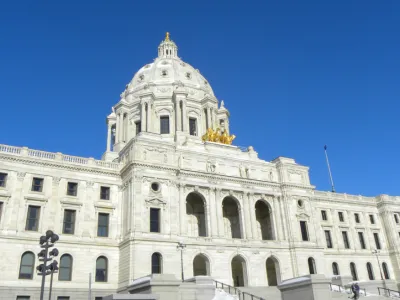Capitol update: Legislation advances to support ratepayer representation in energy decision making

The Minnesota Legislature returned from its Easter/Passover break this week and heads into the last six weeks of its session. It’s already been a productive year, with the early passage of a 100% clean electricity standard along with nearly two dozen other pieces of legislation. Now, legislators turn to combine hundreds of proposals into “omnibus” bills, including a major climate- and energy-related policy and budget package (HF2754-Acomb, SF2847, and SF2542-Frentz).
Here’s an update on CUB’s priorities for the session.
Expanding public-interest representation in utility regulation
(HF2439-Hollins, SF2460-Xiong)
The omnibus bills advanced by the House and Senate both include a provision to improve the state’s “intervenor compensation” statute. This statute allows qualifying nonprofits and other public-interest participants to earn reimbursement for certain costs related to participating in proceedings of the Public Utilities Commission (PUC).
The PUC determines electric and gas rates, the sources and siting of energy resources, the design of programs, and much more for Minnesota’s largest utilities. By law, the PUC makes decisions based only on the evidence and arguments presented by participants in each proceeding. However, proceedings are extremely complicated and resource-intensive, so Minnesotans are often not well represented – especially for low-income, BIPOC, and other Minnesotans who are hit hardest by energy costs and pollution.
State law currently allows for limited compensation in PUC cases in which a utility seeks to raise its base rates. This is helpful but covers just a tiny fraction of the important work conducted by the PUC – and even excludes the majority of proceedings that raise costs on ratepayers.
CUB has championed this bill for three years. It will provide compensation for a broader range of PUC proceedings, allow Tribal nations to qualify for compensation, and make other important updates to the existing law.
We understand that the Senate plans to adopt an amendment to restrict the types of proceedings in which compensation could be available, reduce the compensation amounts, and add a “sunset” (reverting back to the existing law after five years). The House bill will not include those limitations, so the two bodies will work out the differences before the end of the session. CUB, and many other supporters of this bill, will continue to push for a strong bill with no sunset provision.
Energy Assistance funding
Given unusually high energy prices and the financial pressures many households are feeling because of inflation, CUB developed a proposal to provide additional funding to support the state’s Energy Assistance program.
Minnesota receives federal funding for Energy Assistance each year (about $125 million in a typical year). This assistance is extremely important to thousands of income-qualified households, but it still only reaches about 20-25% of qualifying households.
CUB, together with the Energy CENTS Coalition, MinnCAP, and others, proposed a one-time appropriation of $100 million. This would fund additional assistance to families over the next five years, with an emphasis on reaching households that are not being served currently. It would also allow the program to stay open through the summer – a crucial period when thousands of Minnesotans face utility shutoffs, and little assistance is typically available.
Unfortunately, this proposal is not included in the House or Senate climate and energy omnibus bills at this point. However, we continue to work with the bills’ authors and legislative leaders to seek all or some of the requested funding.
And much more
The omnibus bills also include many other important provisions that CUB has supported this year, such as:
- A dispute resolution process for utility customers whose complaints are not fully resolved by the PUC consumer affairs staff.
- Weatherization assistance to help qualifying Minnesotans permanently reduce their energy burdens. Pre-weatherization assistance and workforce training will help the state make the most of additional funding from the federal government.
- Funding to allow the Clean Energy Resource Teams (CERTs) to continue to help communities around the state advance local energy goals.
- A modification to the definition of “low-income household,” which determines who qualifies for utility low-income conservation programs. This is a needed fix to prevent currently eligible households from being disqualified. It will also reduce duplicative paperwork and ease the administrative burdens of the programs.
- Full funding for the PUC and Department of Commerce’s energy sections, which will help Minnesota move quickly toward our clean energy goals without sacrificing consumer protections in the process.
Much work remains to be done between now and May 22, the last day of the legislative session. We’ll share more here, and you can watch CUB’s Facebook and Twitter for more timely updates.